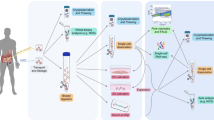Abstract
Intestinal stem cells continuously self-renew throughout life to maintain gut homeostasis. With the advent of the organoid culture system, we are now able to indefinitely expand healthy and diseased tissue-derived human intestinal stem cells in vitro and use them for various applications. Nonetheless, investigating the behavior of human intestinal stem cells in vivo still remains challenging. We recently developed an orthotopic xenotransplantation system that realizes in vivo reconstruction of human intestinal epithelial tissue with preserved stem cell hierarchy by engrafting human normal colon organoids onto the mouse colon surface. We also introduced new growth factors, namely, insulin-like growth factor-1 (IGF-1) and fibroblast growth factor-2 (FGF-2), into the culture condition for human intestinal organoids that significantly increase scalability and transfectability of the organoids. By integrating these recent advances, we organized a tissue-oriented platform encompassing derivation of patient-derived intestinal organoids and their orthotopic xenotransplantation. The research platform based on orthotopic xenotransplantation of human intestinal organoids provides a powerful tool for studying human intestinal stem cell biology in native tissue-relevant contexts as well as for establishing novel disease modeling systems.
Access this chapter
Tax calculation will be finalised at checkout
Purchases are for personal use only
Similar content being viewed by others
References
Sato T, Vries RG, Snippert HJ et al (2009) Single Lgr5 stem cells build crypt-villus structures in vitro without a mesenchymal niche. Nature 459:262–265
Sato T, Stange DE, Ferrante M et al (2011) Long-term expansion of epithelial organoids from human colon, adenoma, adenocarcinoma, and Barrett's epithelium. Gastroenterology 141:1762–1772
Mihara E, Hirai H, Yamamoto H et al (2016) Active and water-soluble form of lipidated Wnt protein is maintained by a serum glycoprotein afamin/alpha-albumin. Elife 5:e11621. https://doi.org/10.7554/eLife.11621
Fujii M, Matano M, Toshimitsu K et al (2018) Human intestinal organoids maintain self-renewal capacity and cellular diversity in niche-inspired culture condition. Cell Stem Cell 23:787–793.e6
Sugimoto S, Ohta Y, Fujii M et al (2018) Reconstruction of the human colon epithelium in vivo. Cell Stem Cell 22:171–176.e5
Fukuda M, Mizutani T, Mochizuki W et al (2014) Small intestinal stem cell identity is maintained with functional Paneth cells in heterotopically grafted epithelium onto the colon. Genes Dev 28:1752–1757
Fujii M, Matano M, Nanki K et al (2015) Efficient genetic engineering of human intestinal organoids using electroporation. Nat Protoc 10:1474–1485
Seino T, Kawasaki S, Shimokawa M et al (2018) Human pancreatic tumor Organoids reveal loss of stem cell niche factor dependence during disease progression. Cell Stem Cell 22:454–467.e6
Ootani A, Li X, Sangiorgi E et al (2009) Sustained in vitro intestinal epithelial culture within a Wnt-dependent stem cell niche. Nat Med 15:701–706
Farin HF, Van Es JH, Clevers H (2012) Redundant sources of Wnt regulate intestinal stem cells and promote formation of Paneth cells. Gastroenterology 143:1518–1529.e7
Koo BK, Stange DE, Sato T et al (2011) Controlled gene expression in primary Lgr5 organoid cultures. Nat Methods 9:81–83
Acknowledgments
This work was in part supported by the Research Center Network for Realization of Regenerative Medicine project from the Japan Agency for Medical Research and Development.
Author information
Authors and Affiliations
Corresponding author
Editor information
Editors and Affiliations
Rights and permissions
Copyright information
© 2020 Springer Science+Business Media, LLC, part of Springer Nature
About this protocol
Cite this protocol
Sugimoto, S., Fujii, M., Sato, T. (2020). Organoid Derivation and Orthotopic Xenotransplantation for Studying Human Intestinal Stem Cell Dynamics. In: Ordóñez-Morán, P. (eds) Intestinal Stem Cells. Methods in Molecular Biology, vol 2171. Humana, New York, NY. https://doi.org/10.1007/978-1-0716-0747-3_21
Download citation
DOI: https://doi.org/10.1007/978-1-0716-0747-3_21
Published:
Publisher Name: Humana, New York, NY
Print ISBN: 978-1-0716-0746-6
Online ISBN: 978-1-0716-0747-3
eBook Packages: Springer Protocols




